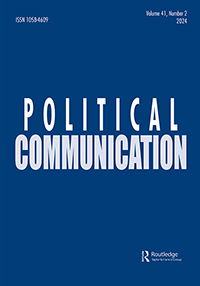是什么推动了人们对外国新闻报道可信度的认知?包括哈萨克斯坦,俄罗斯和乌克兰在内的跨国实验
IF 4.6
1区 社会学
Q1 COMMUNICATION
引用次数: 1
摘要
摘要关于新闻可信度和假新闻易感性的研究主要集中在个人和信息层面的因素上,这些因素解释了为什么人们认为某些新闻项目比其他新闻项目更可信。我们认为,信息内容与主流叙事的一致性也可以具有强大的解释能力,尤其是在国际新闻领域。我们使用三个后苏联国家的8559名社交媒体用户样本对这一假设进行了实验验证。我们的分析表明,与主流叙事的一致性提高了外交新闻的可信度,而与它们的真实性无关。我们还展示了国际冲突、政府支持和新闻语言在某些国家背景下的调节作用,但在其他国家则不然。最后,我们报告了这些因素对可信度的影响如何根据新闻项目是真实的还是捏造的而变化,并讨论了我们的研究结果的社会影响。本文章由计算机程序翻译,如有差异,请以英文原文为准。
What Drives Perceptions of Foreign News Coverage Credibility? A Cross-National Experiment Including Kazakhstan, Russia, and Ukraine
ABSTRACT Research on news credibility and susceptibility to fake news has overwhelmingly focused on individual and message-level factors explaining why people view some news items as more credible than others. We argue that the consistency of the message’s content with the dominant mainstream narrative can have a powerful explanatory capacity as well, particularly in the domain of international news. We test this hypothesis experimentally using a sample of 8,559 social media users in three post-Soviet countries. Our analyses suggest that the consistency with the dominant narrative increases the perceived credibility of foreign affairs news independently of their veracity. We also demonstrate the moderating role of international conflict, government support, and news language in some national contexts but not others. Finally, we report how the effects of these factors on credibility vary according to whether the news items are real or fabricated and discuss the societal implications of our findings.
求助全文
通过发布文献求助,成功后即可免费获取论文全文。
去求助
来源期刊

Political Communication
Multiple-
CiteScore
13.90
自引率
2.70%
发文量
30
期刊介绍:
Political Communication is a quarterly international journal showcasing state-of-the-art, theory-driven empirical research at the nexus of politics and communication. Its broad scope addresses swiftly evolving dynamics and urgent policy considerations globally. The journal embraces diverse research methodologies and analytical perspectives aimed at advancing comprehension of political communication practices, processes, content, effects, and policy implications. Regular symposium issues delve deeply into key thematic areas.
 求助内容:
求助内容: 应助结果提醒方式:
应助结果提醒方式:


